Looking for the best IT certifications for beginners? You’re in the right place. Whether you’re a student, a career changer, or simply curious about IT, earning the right entry-level certifications can help you build confidence, gain job-ready skills, and stand out to hiring managers.
In this guide, we’ll explore the most popular fundamentals certifications and beginner-friendly CompTIA certifications that teach practical skills and prepare you for your first role in IT. We’ll also cover Cisco’s CCNA, a widely respected networking certification that is separate from CompTIA but often recommended after you’ve built your foundation.
You’ll learn which certification exams are easiest to start with, which professional certificate programs deliver the most value, and how to choose the path that fits your career goals.
We’ll also walk through two key stages of IT certifications: Stage 1, designed for those with little or no technical background, and Stage 2, which helps you dive deeper into networking concepts and prepare for cybersecurity, cloud, or systems administration roles.
By the end, you’ll know exactly which certifications to pursue first and how to use them to build a career in IT that opens doors and creates opportunities.
How to Pick the Right IT Certification
Before starting your IT certification journey, it’s important to think about your career path and evaluate where you are right now. This self-assessment helps you understand your foundational knowledge, identify gaps in your technical skills, and choose a realistic starting point that matches both your goals and the job market.
Begin by asking yourself: Do you already know the basic concepts of computing, networking, and security, or are you completely new to IT? If you’re starting from scratch, pursuing Stage 1 certifications is the best way to build confidence and establish a strong base. These are considered valuable certifications because they prove to you (and future employers) that you’ve mastered the fundamentals and are ready to move forward.
If you already have some hands-on experience or are familiar with IT systems (for example, if you’re a power user, a non-IT security manager, or someone who has worked alongside IT teams), you may be ready to jump ahead to Stage 2 certifications. These more advanced professional certifications focus on deeper networking knowledge and prepare you for roles with greater responsibility.
Choosing the right starting point isn’t just about passing an exam, but creating a clear, step-by-step career path that helps you gain job-ready skills and progress toward the role you want.
Stage 1 and Stage 2 IT Certifications Explained
At StationX, we’ve carefully designed a clear roadmap to guide you toward a successful tech career in the IT field or cybersecurity. This roadmap breaks your learning journey into two stages, each focusing on building the right skills at the right time so you can progress confidently into more advanced job roles.
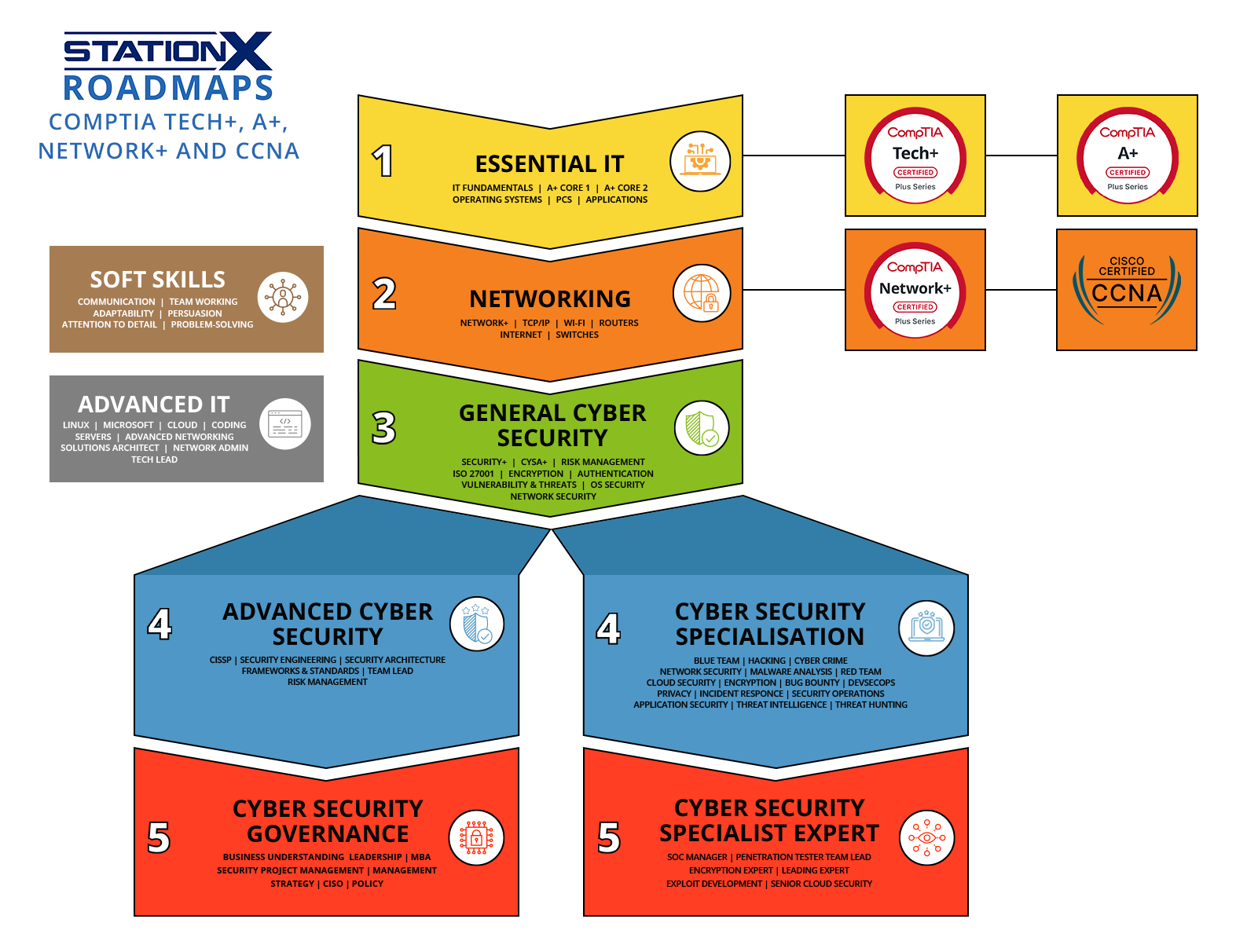
Stage 1 certifications focus on the fundamentals. Each certification covers the key concepts you need to build a strong technical foundation - from hardware and operating systems to networking basics and security fundamentals. These certifications are perfect for those starting out, as they prepare you for entry-level roles and ensure you have the foundational knowledge required before advancing to more complex subjects. Think of this stage as your launchpad into IT, helping you master the basics before moving on to specialized cybersecurity certifications or advanced networking training.
Stage 2 certifications go deeper into networking and infrastructure. Here, each certification covers topics like routing, switching, wireless networking, and network troubleshooting. This stage is where you gain the knowledge and technical skills required to excel in hands-on network administration and support job roles. Stage 2 is also the perfect bridge for moving into higher-level certifications and career paths such as network engineering, cloud computing, and cybersecurity analysis.
Together, Stage 1 and Stage 2 certifications act as stepping stones to help you start and accelerate your career in IT. They not only provide you with measurable milestones but also ensure you’re building the right skills to meet real-world business needs and prepare for long-term success.
Stage 1: Essential IT
If we want to talk about Stage 1 Essential IT certifications, CompTIA Tech+ and CompTIA A+ are two famous entry-level certifications designed for individuals with little to no IT experience.
CompTIA Tech+

CompTIA Tech+ is the newest entry-level certification from CompTIA, designed to replace ITF+ and provide a modern, hands-on introduction to the IT field. This certification helps individuals confirm whether an IT career is right for them and builds a practical foundation in computing, networking, security, and troubleshooting.
Tech+ goes beyond just theory and emphasizes real-world problem-solving and practical IT skills that prepare you to support basic technology environments.
Who Can Benefit From CompTIA Tech+?
CompTIA Tech+ is designed for anyone who wants to build confidence with technology, whether for personal growth, professional development, or as the first step toward a future IT career.
- Students and Career Changers: Tech+ is perfect for those considering a move into IT but unsure where to start. It lets you explore computing, networking, and troubleshooting concepts in a structured way so you can see if IT is the right fit before committing to more advanced training like A+ or Network+.
- Non-Technical Professionals: Marketing, operations, sales, and business professionals benefit by learning how the systems they rely on actually work. This knowledge helps you communicate better with IT teams, solve simple problems yourself, and reduce downtime caused by tech issues.
- Aspiring IT Support Professionals: While Tech+ alone won’t land you a job, it sets the foundation for roles like IT Support Technician, Junior Help Desk Analyst, or Computer Lab Assistant, especially when followed up with certifications like CompTIA A+ or Google IT Support.
- Small Business Owners and Power Users: Entrepreneurs and freelancers can use Tech+ skills to set up their own devices, install and configure software, secure their networks, and troubleshoot common problems without waiting on outside IT support.
By earning Tech+, you’ll demonstrate the ability to set up workstations, install and configure software, connect to networks, troubleshoot common issues, and apply basic cybersecurity hygiene.
What Will You Learn With CompTIA Tech+?
CompTIA Tech+ gives you a comprehensive, practical foundation in IT so you can work confidently with technology, troubleshoot issues, and prepare for more advanced certifications like A+ or Network+. Each domain builds real-world skills you can apply right away:
- Tech Concepts and Terminology (13%)
Explore the fundamentals of computing (input, processing, output, and storage), work with binary and hexadecimal systems, understand units like gigabytes and gigahertz, and follow a structured troubleshooting methodology to solve and document issues effectively. - Infrastructure (24%)
Get familiar with internal components like CPUs, RAM, and storage drives, set up peripherals and interfaces, configure wired and wireless networks, and work with virtualization, cloud service models, and basic network security devices like routers and firewalls. - Applications and Software (18%)
Understand how operating systems function across desktop, mobile, and server environments, manage drivers and utilities, use collaboration tools, secure web browsers, and even explore AI-powered assistants and chatbots to see how they support productivity. - Software Development Concepts (13%)
Dive into the basics of programming logic with variables, arrays, and functions, distinguish between scripting and compiled languages, and practice breaking problems into steps using pseudocode and flowcharts. - Data and Database Fundamentals (13%)
See how data is structured and stored, compare relational and non-relational databases, run basic queries, and implement backup strategies for both local and cloud environments to keep data safe. - Security (19%)
Apply core security principles like confidentiality, integrity, and availability, set strong passwords, patch systems, use firewalls and anti-malware, practice safe browsing, and understand how encryption and VPNs protect sensitive data.
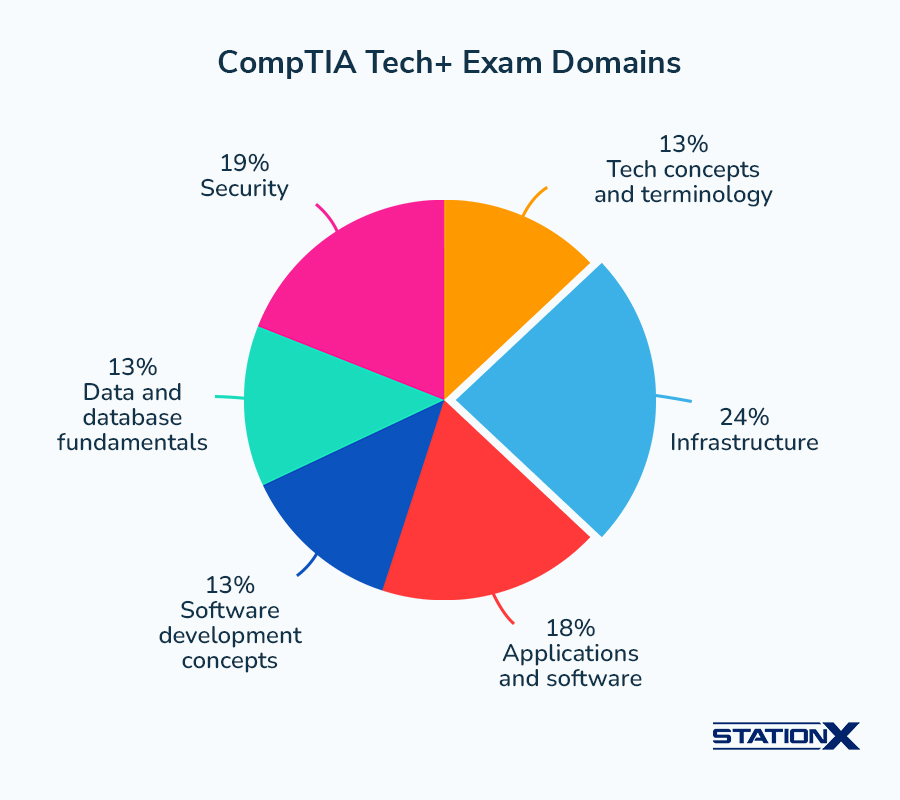
CompTIA Tech+ Exam Details
- Exam Code: FC0-U71
- Number of Questions: Up to 75 questions per exam
- Format: Multiple Choice
- Duration: 60 Minutes
- Passing Score: 650 (on a scale of 900)
- Exam Cost: $125 USD
CompTIA Tech+ Resources:
You might find the CompTIA Tech+ Certification Course Bundle especially useful if you’re aiming to build or solidify foundational IT knowledge. The bundle gives you lifetime access (one-time purchase) to a full video course plus two full practice exams, 300+ flashcards, 14 quizzes, and resources covering everything Tech+ tests: hardware, software, basic networking, cybersecurity principles, and troubleshooting.
It’s a great way to prepare with confidence before moving into more technical certs like A+, CySA+, or Network+, especially if you're newer to tech and want structured material and exam-like practice up front.
CompTIA A+

The CompTIA A+ certification is one of the most recognized entry-level credentials in the tech industry and is considered the gold standard for launching a career in IT support. It validates that you have the hands-on skills to install, configure, troubleshoot, and secure hardware, software, and networks to keep business systems running smoothly.
A+ is often the first step in a larger certification path, leading to more advanced credentials like Network+, Security+, and even cloud or cybersecurity certifications. When combined with other entry-level certifications such as CompTIA Tech+ or Google IT Support, it creates a strong foundation that hiring managers look for when filling IT support roles. Earning A+ can prepare you for roles such as technical support specialist, help desk technician, desktop support administrator, service desk analyst, or field service technician.
Who Can Benefit From CompTIA A+?
CompTIA A+ is the industry standard starting point for anyone looking to build a career in IT support and technical operations. It’s designed to take you from basic computer familiarity to being job-ready for real-world IT environments.
A+ is ideal for:
- Career Starters: Individuals with little to no professional IT experience who want a recognized credential to break into the field.
- Career Changers: Professionals moving from non-technical backgrounds into IT support, desktop support, or service desk roles.
- Technical Support Staff: Those already doing troubleshooting or IT work informally and looking to validate their skills with a formal certification.
- Students and Recent Graduates: Anyone seeking to add credibility to their résumé and show employers they have hands-on IT skills.
Roles you can pursue with A+:
- Help Desk Technician (Tier 1 or Tier 2)
- Desktop Support Technician
- IT Support Specialist
- Field Service Technician
- Computer Repair Technician
- Service Desk Analyst
CompTIA A+ is especially valuable for anyone who wants to support and troubleshoot desktops, laptops, mobile devices, and operating systems in today’s on-premises, hybrid, and cloud-enabled workplaces. By earning A+, you demonstrate to employers that you can keep business-critical systems running, respond to support tickets, and solve problems efficiently - skills that are in high demand across all industries.
What Will You Learn With CompTIA A+?
The CompTIA A+ exam covers the following domains and topics:
Core 1 Domains (220-1201):
- Hardware & Network Troubleshooting (28%)
Learn to diagnose and fix hardware and connectivity issues, interpret error codes, test cables, and apply systematic troubleshooting methods. - Mobile Devices (13%)
Configure, manage, and troubleshoot smartphones, tablets, and laptops, including network setup and hardware replacement. - Networking (23%)
Understand TCP/IP, Wi-Fi standards, subnetting, cabling, and cloud connectivity while configuring and troubleshooting networks. - Hardware (25%)
Identify, install, and upgrade PC components including CPUs, RAM, storage devices, displays, and peripherals. - Virtualization & Cloud Computing (11%)
Work with hypervisors, virtual machines, and service models like IaaS, PaaS, and SaaS.
Core 2 Domains (220-1202):
- Operational Procedures (21%)
Follow professional standards including documentation, change management, incident response, and safety protocols. - Operating Systems (28%)
Install, configure, and maintain Windows, macOS, Linux, and mobile OS environments using both GUI and CLI tools. - Security (28%)
Implement authentication, permissions, malware prevention, and endpoint protection best practices. - Software Troubleshooting (23%)
Diagnose and resolve OS crashes, boot failures, malware infections, and application issues.
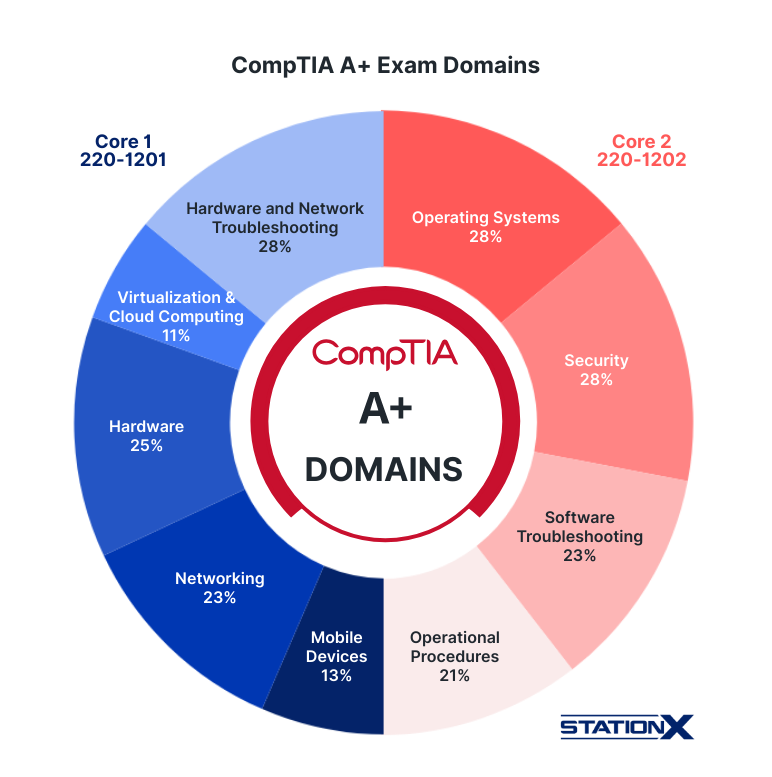
CompTIA A+ Exam Details:
To earn your CompTIA A+ certification, you must pass two separate exams - Core 1 (220-1201) and Core 2 (220-1202). Both exams are required to become A+ certified, and you can take them in any order.
- Exam Code: Exam 220-1201 (Core 1) and Exam 220-1202 (Core 2)
- Number of Questions: Maximum of 90 questions per exam
- Test Format: Multiple choice and performance-based questions
- Duration: 90 Minutes
- Passing Score:
- 220-1201: 675 (on a scale of 100-900)
- 220-1202: 700 (on a scale of 100-900)
- CompTIA A+ 220-1201 Exam Voucher Cost (1 exam voucher): $253 USD
- CompTIA A+ 220-1202 Exam Voucher Cost (1 exam voucher): $253 USD
CompTIA A+ Resources
If you’re preparing for CompTIA A+, consider using the CompTIA A+ Certification Course Bundle from StationX. This bundle is available as a one-time purchase with lifetime access, giving you unlimited opportunities to revisit the material whenever you need.
It includes video courses, practice exams, quizzes, and flashcards aligned with the Core 1 and Core 2 domains, helping you reinforce your understanding and build confidence before exam day.
Stage 2: Networking
So, now that you have a basic understanding of Stage 1 certifications, let’s dive deeper into Stage 2 and see how it fits into your certification path.
Stage 2 certifications build on your foundational certification from Stage 1 (such as CompTIA A+) and focus heavily on networking. This stage is where you move beyond the most entry-level certifications and start developing the skills that will set you apart in the job market.
CompTIA Network+

CompTIA Network+ is designed to validate your networking knowledge and skills. Network+ can be helpful for IT professionals to gain additional knowledge and eventually pursue careers in network administration, support, and related roles. It also provides a strong foundation for those who eventually want to move into cyber security.
This certification equips you with the fundamental networking expertise required to manage, troubleshoot, and secure wired and wireless networks. Here's a closer look at CompTIA Network+.
Who Can Benefit From CompTIA Network+?
CompTIA Network+ is the go-to certification for anyone who wants to build a solid foundation in networking before moving into more advanced or specialized roles like cyber security, systems administration, or cloud engineering. It’s ideal for IT professionals who already have some basic technical experience (or have completed A+) and want to deepen their understanding of how networks function.
Network+ is ideal for:
- Career Starters and IT Support Staff: Those ready to move from basic help desk roles into network-focused positions.
- Career Changers: Professionals transitioning into IT who want to show they understand networking fundamentals and protocols.
- Aspiring Cyber Security Professionals: Individuals who need a strong grasp of networking concepts before pursuing security certifications like Security+ or CySA+.
- Systems and Server Technicians: Those responsible for configuring or troubleshooting network-connected systems who want a more formal understanding of network architecture.
Roles you can target with Network+:
- Network Administrator
- Systems Administrator
- Server Administrator
- Solutions Architect
- Security Architect
- Tier II IT Support Technician
- IT Support Manager
- IT Administrator
CompTIA Network+ demonstrates your ability to configure, manage, and troubleshoot wired and wireless networks, laying the groundwork for careers in networking, cloud computing, and security operations. It’s a crucial stepping stone if you plan to earn certifications like Security+, CySA+, CCNA, or even move into cloud certifications (AWS, Azure) down the line.
What Will You Learn With CompTIA Network+?
CompTIA Network+ takes you beyond basic IT support knowledge and gives you the ability to configure, manage, and troubleshoot networks in real-world environments. It covers everything from the underlying principles of networking to the practical tasks of building and maintaining wired and wireless networks.
- Networking Concepts (23%)
Understand the foundations of networking, including the OSI and TCP/IP models, common ports and protocols, IP addressing and subnetting, and network topologies. Learn about IPv4 and IPv6, routing concepts, and how data flows across networks. - Network Implementation (20%)
Learn to install and configure network devices like switches, routers, and wireless access points. Cover VLANs, routing protocols, WAN technologies, and network storage options. Understand cabling standards, connectors, and how to deploy wired and wireless networks securely. - Network Operations (19%)
Gain the skills to monitor and maintain networks on a day-to-day basis. Learn about network documentation, policies and procedures, disaster recovery plans, and how to implement network segmentation. Explore common network management protocols like SNMP and syslog. - Network Security (14%)
Master essential security concepts for protecting networks, including authentication, authorization, and accounting (AAA). Learn to identify and mitigate common threats, configure secure network devices, and implement security hardening techniques such as port security and access control lists (ACLs). - Network Troubleshooting (24%)
Develop a systematic approach to troubleshooting network problems. Learn to use tools like ping, traceroute, and protocol analyzers, interpret network diagrams, and resolve common connectivity, performance, and configuration issues quickly.
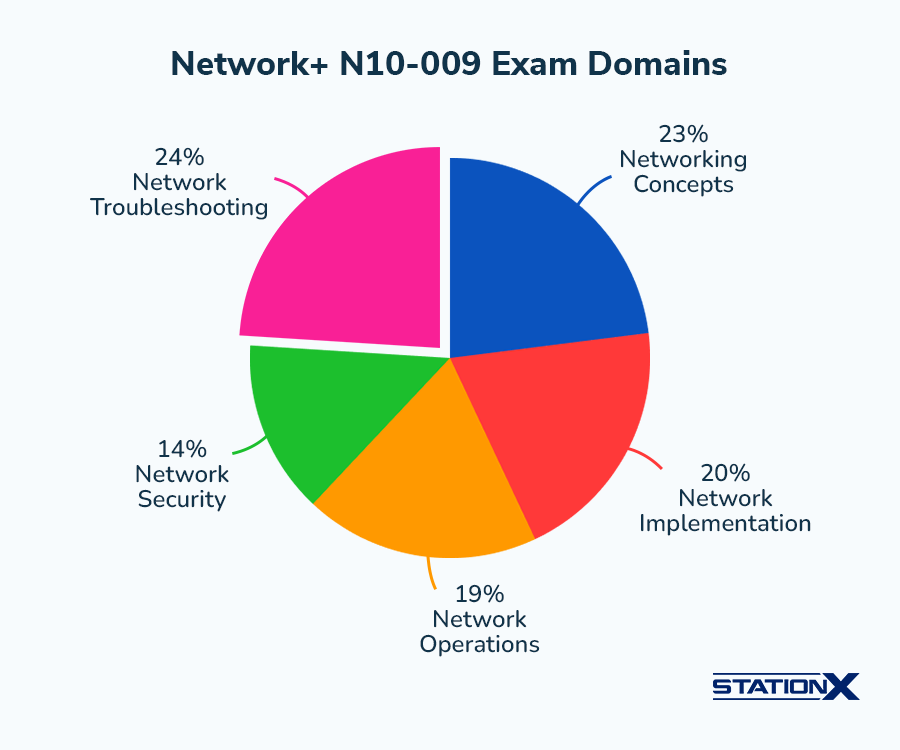
CompTIA Network+ Exam Details:
Following are the CompTIA Network+ exam details:
- Exam Code: N10-009
- Number of Questions: Maximum of 90 questions per exam
- Test Format: Multiple Choice, Performance-Based
- Duration: 90 Minutes
- Passing Score: 720 on a scale of 100-900
- CompTIA Network+ N10-008 Exam Voucher Cost (1 exam voucher): $369 USD
CompTIA Network+ Resources
The CompTIA Network+ Training Bundle is a comprehensive prep pack designed to get you ready for the Network+ (N10-009) certification and to level up your networking skills. Available as a one-time purchase with lifetime access, this bundle lets you study at your own pace and revisit the material anytime. It includes over 35 hours of on-demand video, 5 full practice exams, 300+ flashcards, quizzes, mobile access, and a certificate of completion.
You’ll cover everything from networking protocols, IP addressing, and subnetting, to network devices and cabling, cloud/virtualization basics, network troubleshooting, and relevant security concepts.
Cisco Certified Network Associate (CCNA)

The Cisco Certified Network Associate (CCNA) certification is a prestigious credential offered by Cisco Systems, one of the world's leading networking technology companies.
CCNA is a highly regarded certification demonstrating your expertise in networking fundamentals, making it an excellent choice for individuals pursuing careers in network engineering, administration, and related roles. Here's a detailed overview of the CCNA certification.
Who Can Benefit From CCNA?
The Cisco Certified Network Associate (CCNA) certification is ideal for IT professionals who want to validate their ability to work with enterprise-grade networks. CCNA goes deeper than Network+ and focuses specifically on Cisco technologies, making it a great choice for anyone looking to advance into networking or security roles in environments that use Cisco equipment.
CCNA is ideal for:
- Aspiring Network Engineers: Those who want to design, configure, and maintain enterprise network infrastructure.
- IT Professionals with Networking Experience: Help desk or Tier II techs looking to move into more specialized networking roles.
- Systems and Server Administrators: Professionals who need to strengthen their networking knowledge to support server and virtualization environments.
- Security-Focused Technicians: Those pursuing roles where network security and access control are a major focus.
- Students or Career Changers: Individuals who already have Network+ or equivalent knowledge and want to take the next step toward enterprise networking.
Roles you can target with CCNA:
- Network Engineer
- Network Administrator
- Systems Administrator
- Network Security Engineer
- IT Support Specialist
CCNA demonstrates that you can configure Cisco routers and switches, work with IPv4/IPv6 addressing, set up VLANs, troubleshoot connectivity issues, and secure network infrastructure. This makes it one of the most respected and sought-after certifications for networking professionals.
What Will You Learn With CCNA?
The Cisco Certified Network Associate (CCNA) certification gives you the hands-on knowledge to work with enterprise-class networks, focusing on Cisco technologies but applicable across most networking environments. Here’s what you’ll master in each domain:
- Network Fundamentals (20%)
Learn the foundations of networking, including the OSI and TCP/IP models, IPv4/IPv6 addressing, subnetting, and cabling types. You’ll also study network topologies, data flow, and how to differentiate between physical, logical, and virtual network components. - Network Access (20%)
Understand how to configure and verify VLANs, trunking, and inter-VLAN routing. Learn how to manage switch interfaces, secure ports, and use technologies like Spanning Tree Protocol (STP) and EtherChannel to build reliable and scalable LANs. - IP Connectivity (25%)
Gain deep knowledge of IP routing. Configure and troubleshoot static routes and single-area OSPFv2. Learn how routing tables work, how to interpret them, and how routers forward traffic. This domain ensures you can make sure devices communicate seamlessly across networks. - IP Services (10%)
Learn to configure essential network services like Network Address Translation (NAT), Dynamic Host Configuration Protocol (DHCP), and Network Time Protocol (NTP). You’ll also cover first-hop redundancy protocols (FHRP) for high availability and basic network QoS concepts. - Security Fundamentals (15%)
Understand how to secure network devices and data. Learn to configure device passwords, enable SSH for secure remote management, implement access control lists (ACLs), and apply Layer 2 security best practices like DHCP snooping and port security. - Automation and Programmability (10%)
Explore modern networking concepts like software-defined networking (SDN) and learn how network automation tools and APIs (such as REST APIs) can be used to streamline configuration and monitoring. Get familiar with JSON data and how automation fits into network management.
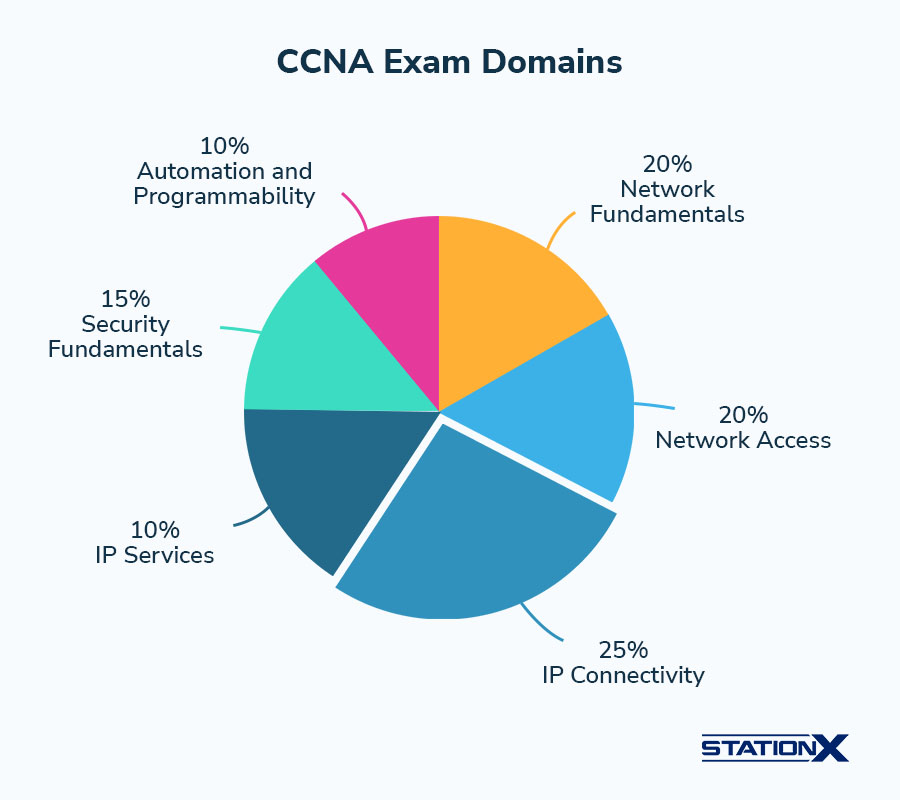
CCNA Exam Details:
- Exam Title: Cisco Certified Network Associate (CCNA)
- Exam Code: CCNA 200-301
- Number of Questions: Typically around 100-120 questions per exam
- Test Format: Multiple Choice and Simulation
- Duration: 120 Minutes
- Passing Score: Cisco exams use a scaled scoring system, and the passing score may vary
- CCNA Exam Cost: $300 USD
CCNA Resources
Our CCNA Certification Training Course bundle is designed to help you master Cisco networking fundamentals and confidently pass the CCNA 200-301 exam. With over 30 hours of online self-paced instruction, this bundle covers everything from routing and switching to IPv4/IPv6 addressing, subnetting, VLANs, network services, ACLs, and network security.
You’ll also get hands-on practice through Cisco Packet Tracer labs (for routing, VLANs, NAT, etc.), plus quizzes and practice exams aligned with the CCNA blueprint.
Best of all, this bundle is available as a one-time purchase with lifetime access, so you can revisit lessons, labs, and practice tests whenever you need a refresher, even after you’ve passed the exam.
Turning Knowledge Into a Career Path
Learning IT concepts is one thing; proving you can apply them is another. Reading through a study guide might feel easy, but until you test yourself, you don’t really know how much you’ve mastered. Certifications help bridge that gap by giving you a measurable milestone to work toward, building both your skills and your confidence.
If you’re brand new to IT, CompTIA Tech+ is a great first step. While employers rarely require it, it gives you a structured way to learn computing, networking, security, and troubleshooting fundamentals. Passing Tech+ proves to yourself that you can handle basic IT tasks like setting up email, connecting devices, and solving common technical issues, skills you’ll need in any modern workplace.
Once you’re comfortable with the basics, CompTIA A+ is the next step. A+ is widely recognized by employers and often a minimum requirement for roles like help desk technician, IT support specialist, and desktop support technician. It validates that you can troubleshoot hardware and software problems, work with operating systems, and keep business-critical systems running.
From there, you can build on your skills with either CompTIA Network+ or CCNA, depending on your career goals:
- Network+: Best if you want a wide but foundational understanding of networking concepts, perfect for those planning to specialize later in areas like cybersecurity, cloud computing, or systems administration.
- CCNA: A more hands-on, role-specific certification focused on configuring and troubleshooting Cisco networks. It’s highly sought after for network administrator, network engineer, and IT administrator positions, even in companies that don’t exclusively use Cisco hardware.
This progression creates a clear pathway:
Tech+ → A+ → Network+ or CCNA → Advanced Specialization (Security+, CySA+, Cloud, etc.)
Following this roadmap ensures you’re not just collecting certifications, but building a solid, layered skill set that prepares you for increasingly advanced roles and higher salaries.
IT Certifications for Beginners: Conclusion
Choosing the right beginner IT certifications is about more than just checking boxes, but building a solid foundation for your future career. Start by identifying where you are today: if you have little or no IT experience, foundational certifications like CompTIA Tech+ or CompTIA A+ will help you gain confidence and prove to yourself that you can perform real-world IT tasks.
As you grow, progress to network-focused certifications like CompTIA Network+ or Cisco CCNA to deepen your understanding of enterprise networking. These credentials prepare you for more specialized paths such as cybersecurity, cloud computing, or systems administration.
Remember, certifications aren’t the only measure of success. Hands-on practice, problem-solving ability, and a genuine passion for technology are just as important. But earning certifications shows employers that you are serious about your career and gives you a competitive edge when applying for IT roles.
If you’re looking to take any of the CompTIA certifications we’ve mentioned, you can save up to 30% on the exam cost by purchasing your voucher through StationX. As an authorized CompTIA partner, we are able to pass on huge savings to you.
For those looking to accelerate their growth, consider joining the StationX Master’s Program. As a member, you gain access to over 30,000 IT and cybersecurity courses, practice labs, career roadmaps, mentorship, and study groups, everything you need to move from beginner to expert, at your own pace.
Your IT journey doesn’t end with a single certification. Treat each milestone as a step toward a bigger goal, stay consistent with your learning, and keep building the skills that will carry you into the next stage of your career.


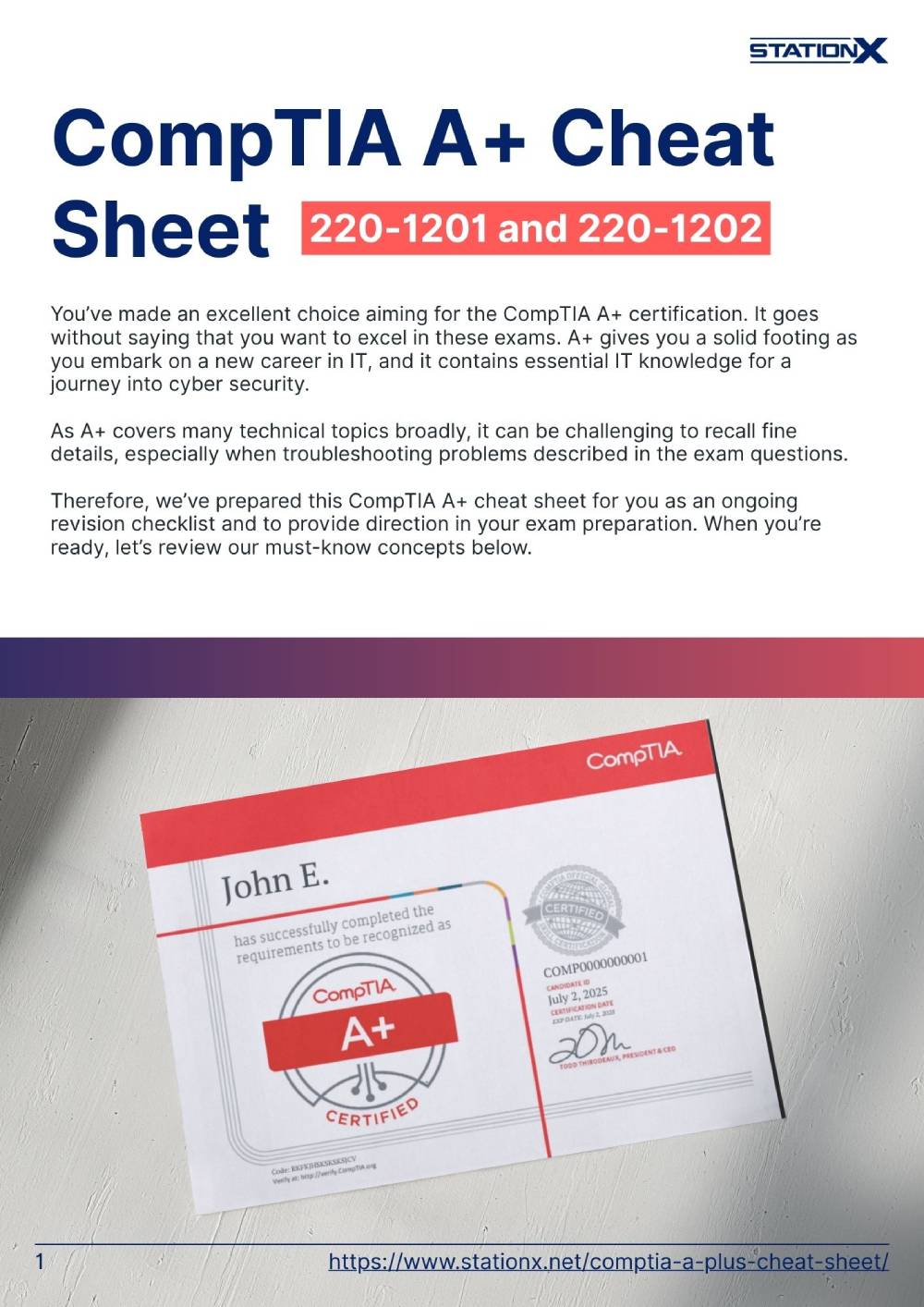






































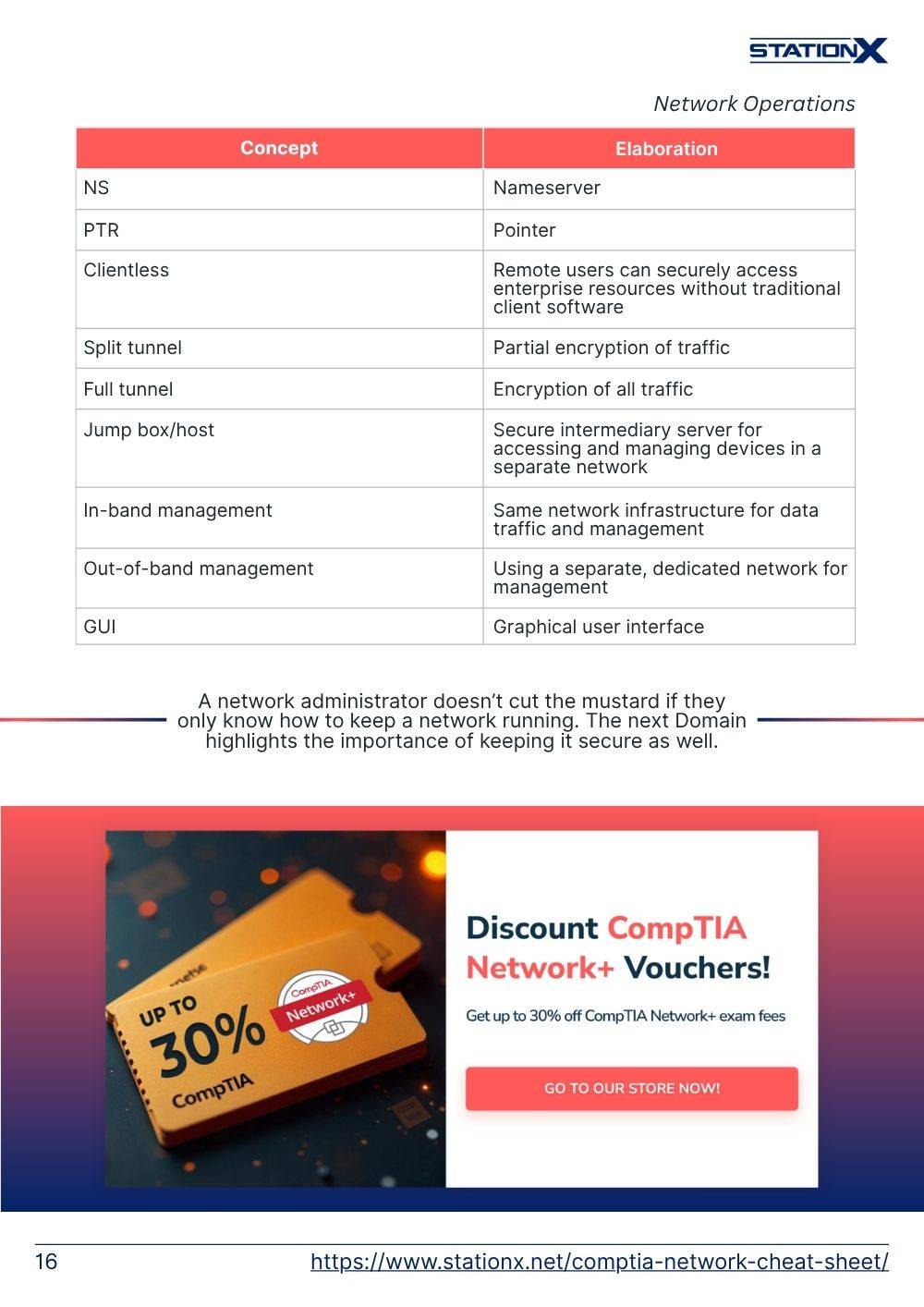



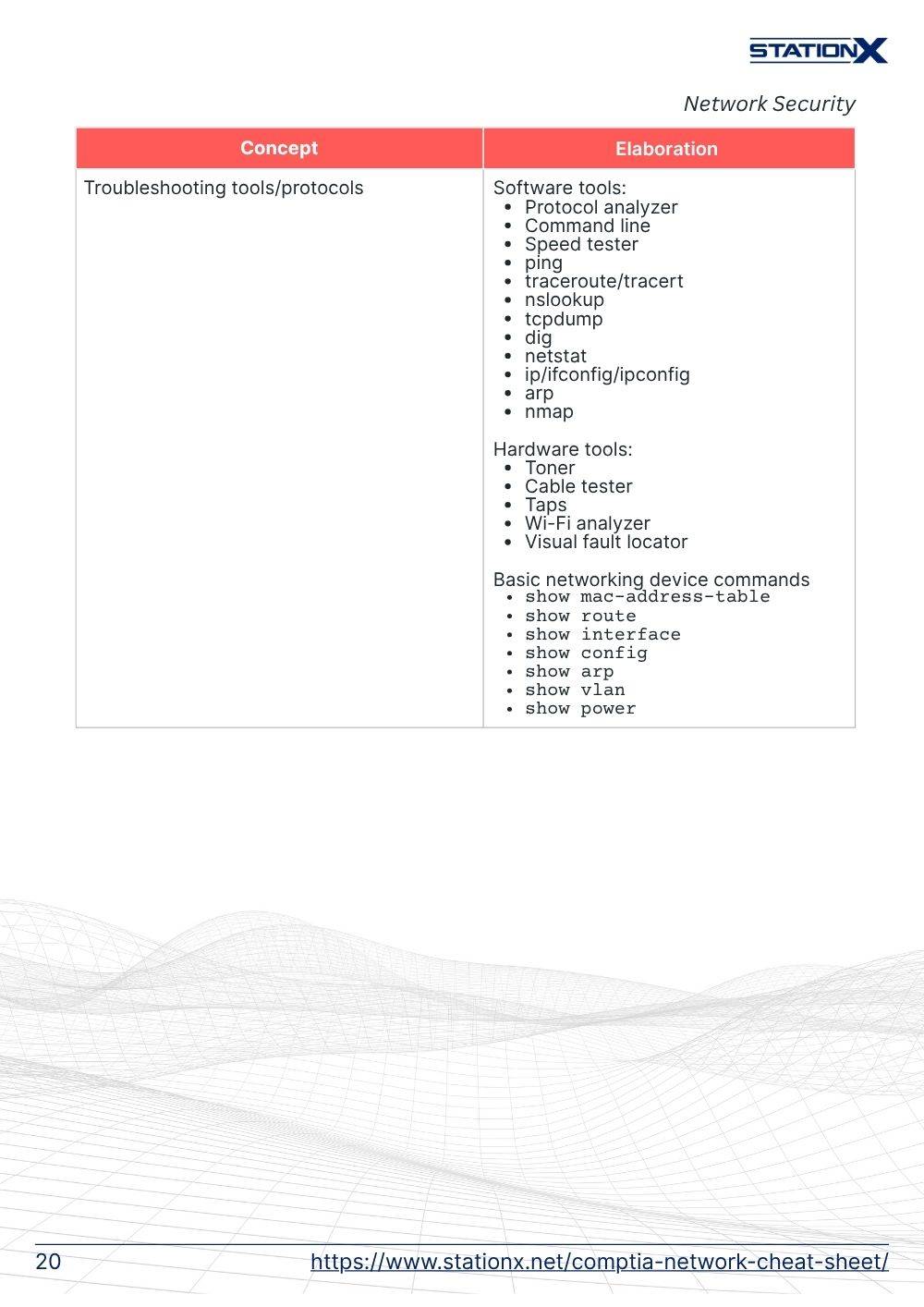

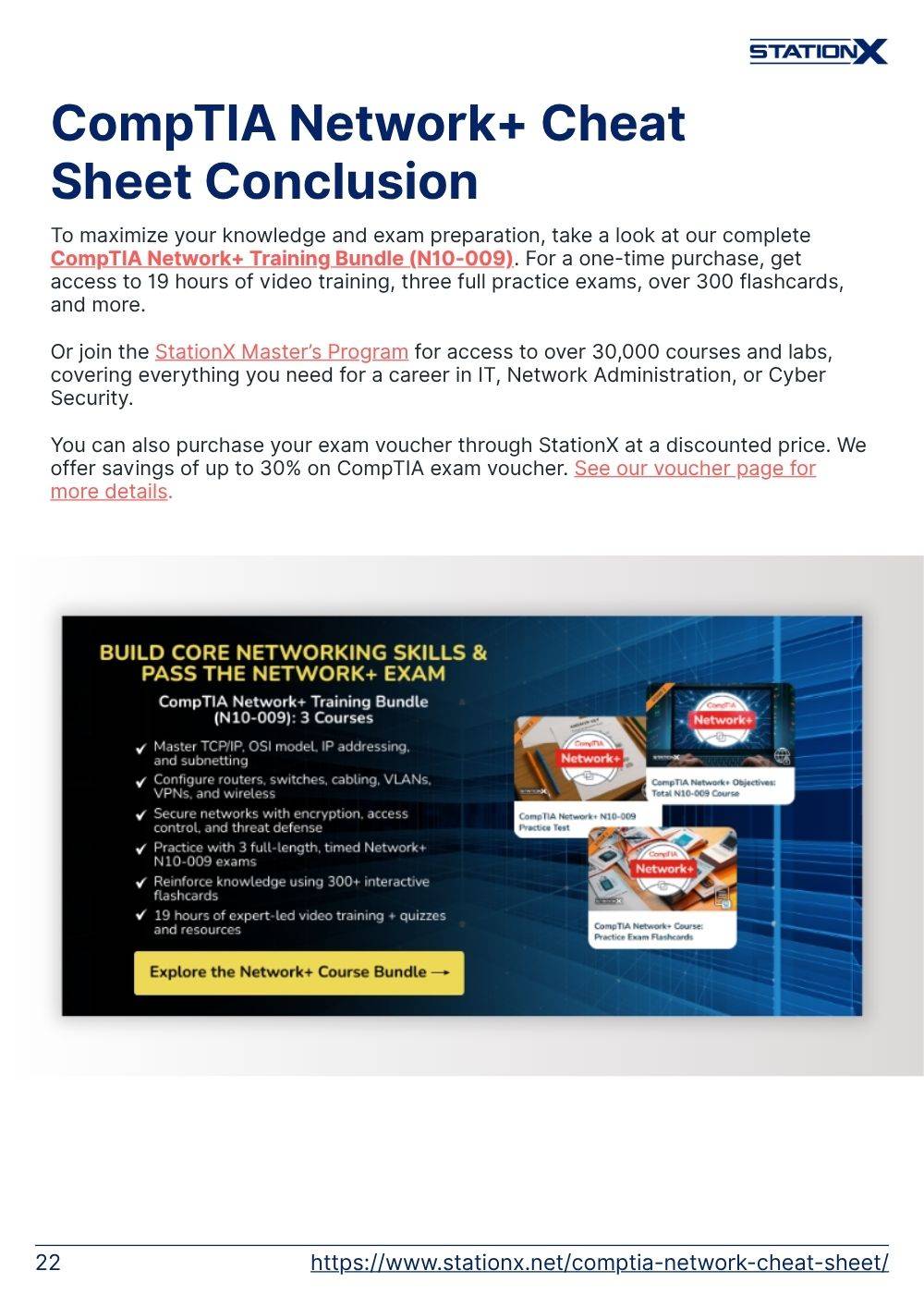
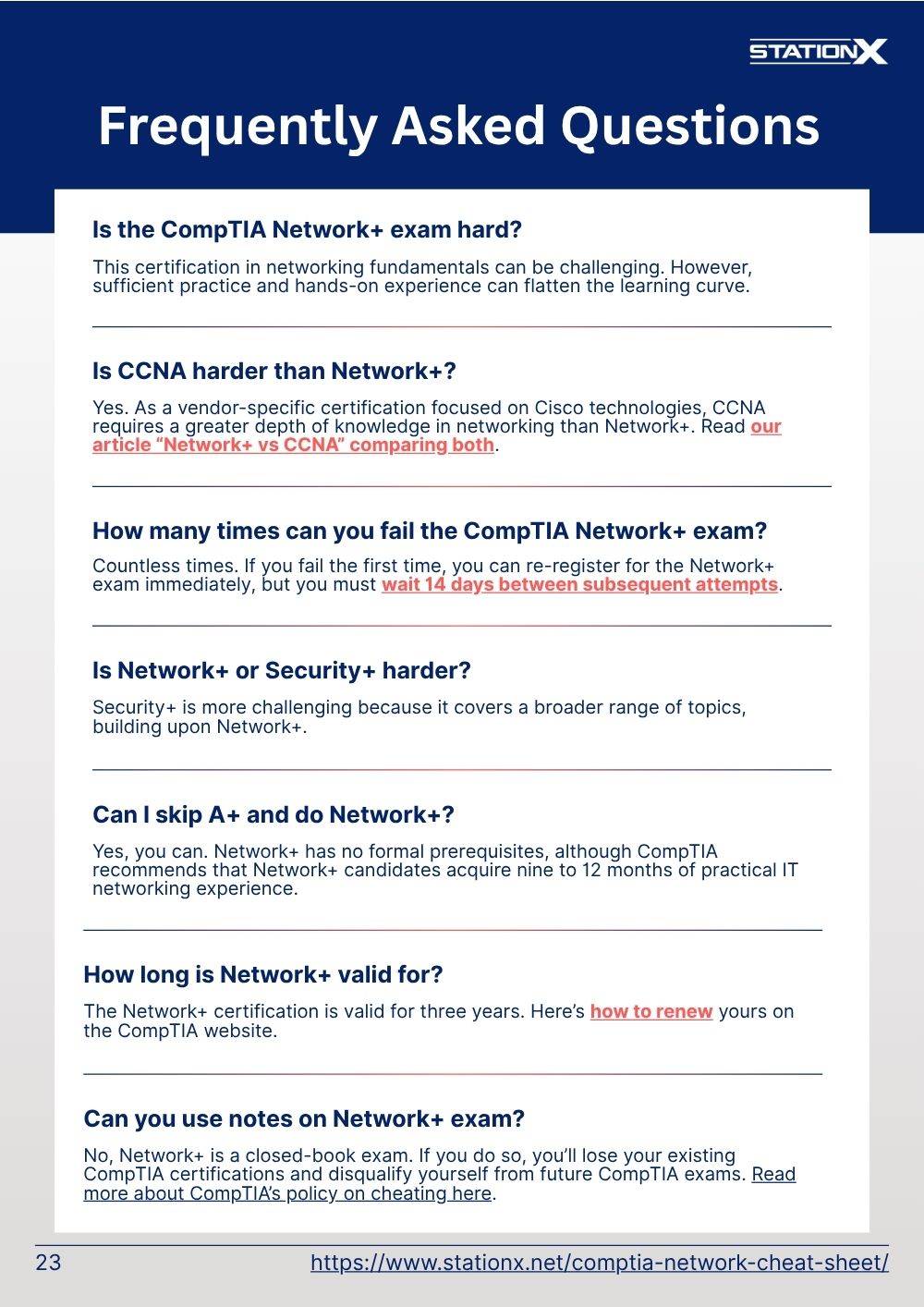
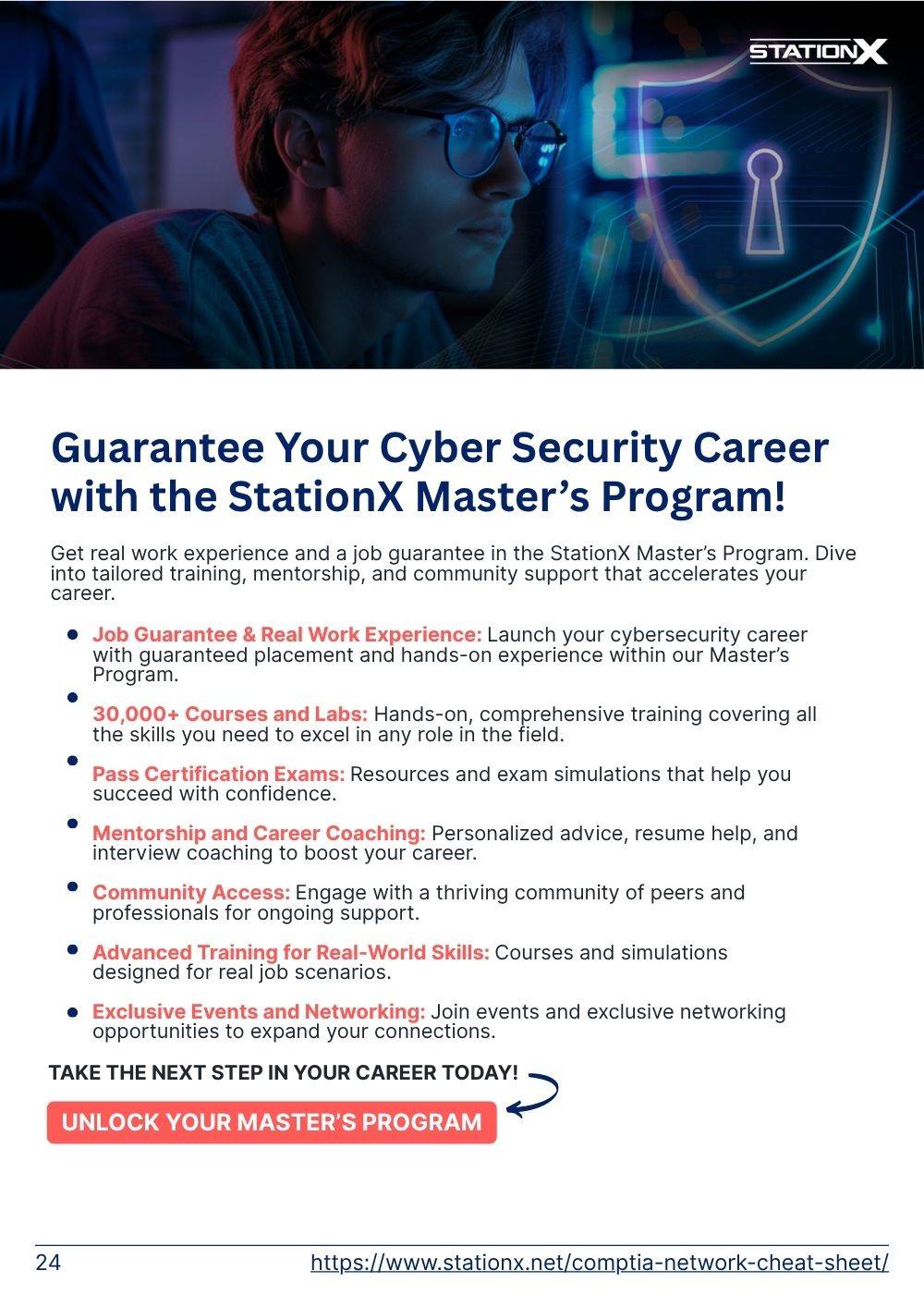

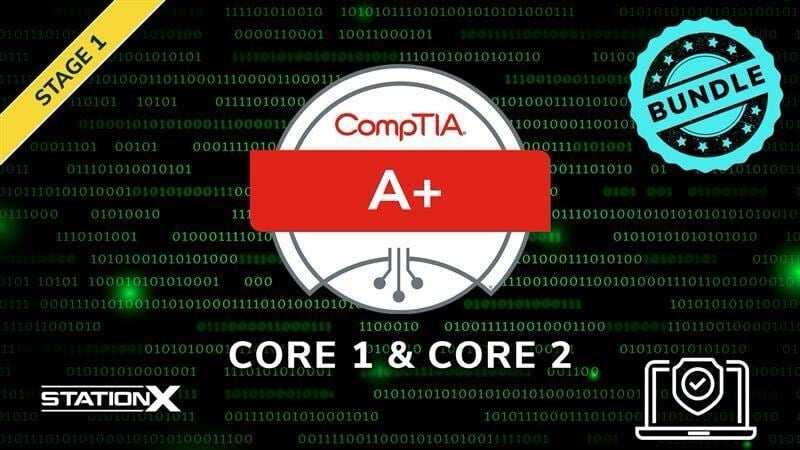





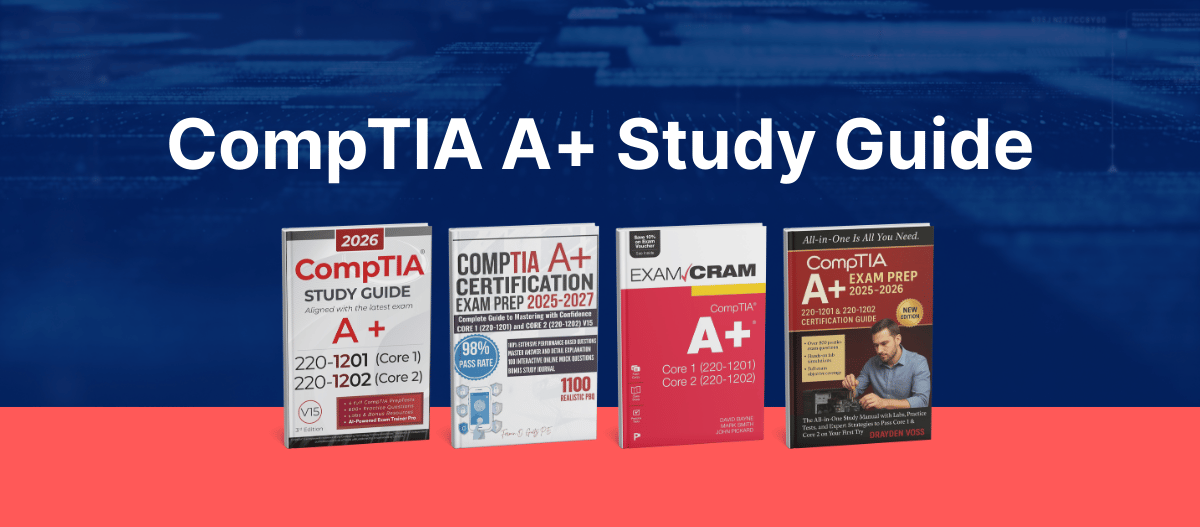
Interested in it beginner6
I’m interested in the courses and would like to also learn programming languages.
Excellent
Hi Nathan,
I have found CompTIA courses to be over promoted and worthless in countries like New Zealand and Australia. I have A+, Network+ and Security+ Certification among other vendor certs and can’t find low end employment.
I think it is also important to point out to your audience that CompTIA exams should not be more expensive than other more recognised vendor certs. In my personal opinion, I have found their exam pricing prohibitively expensive especially when there is an obvious lack of recognition by employers.
Those that are considering taking any certification exams would be well advised to use only the study material from the cert vendor or, where generic material is PROPERLY endorsed by the said vendor. The reason I emphasise this, comes from my own personal experiences where generic study material often masquerades as being aligned with the vendor’s exam(s) but are not.
While CompTIA may not have as strong a foothold in New Zealand and Australia, it’s a key player in the United States and other location, even being a requirement for the Department of Defense. The value of certifications can vary significantly depending on the geographical context.
Not all certifications serve the same purpose. For instance, A+ and Network+ have limited relevance for most cyber security roles. A+ is better suited for tech support, whereas for networking, CCNA is generally considered more robust than Network+. But Network+ is better for people wanting to be general sec pros.
It’s also worth noting that success isn’t exclusive to “endorsed” or expensive training programs. We’ve seen numerous individuals excel without resorting to these cost-intensive endorsed options.
On the subject of cost, CompTIA exams are relatively budget-friendly, especially when compared to certifications like CISSP, CISM, and OSCP, which can cost four to five times more.
In conclusion, the utility of a certification is multifaceted. It can be valuable for gaining knowledge as well as for job placement, but this value is contingent upon the specific role you’re aiming for and the country you’re operating in.
Hi Nathan,
I appreciate your reply and your willingness to allow me to post a negative response that is open to your viewers.
FYI… Person-VUE makes available (for download) the exam prices for most IT Certifications. CompTIA exams currently average about AUD $500 per exam (for the ones that I referenced) compared to almost half this price for more comparable exams from Microsoft and Cisco.
I don’t wish to be pedantic but CompTIA promotes its certification offerings as globally recognised by employers. If this was true, I wouldn’t be disappointed in having spent more than $2,000 passing these exams several years ago.
I am also interested to know if UK employers are demanding these Certs.
This is why we at StationX are committed to personalized training, tailoring recommendations to each individual. While it’s true that CompTIA certifications may not be as widely recognized in the UK & New Zealand, the knowledge gained from them is essential for the roles in question. Thus, although CompTIA certifications aren’t a universal solution for success, they hold significant value. Many of our students have pursued them and found success on their career paths. However, when it comes to securing a job, merely passing exams isn’t sufficient. In fact, at StationX, when we develop personalized roadmaps, obtaining certifications constitutes only about 10% of our focus. There’s a substantial difference between having certifications and being employable. It’s also worth noting that the costs of these certifications are relatively low compared to those offered by other security vendors.